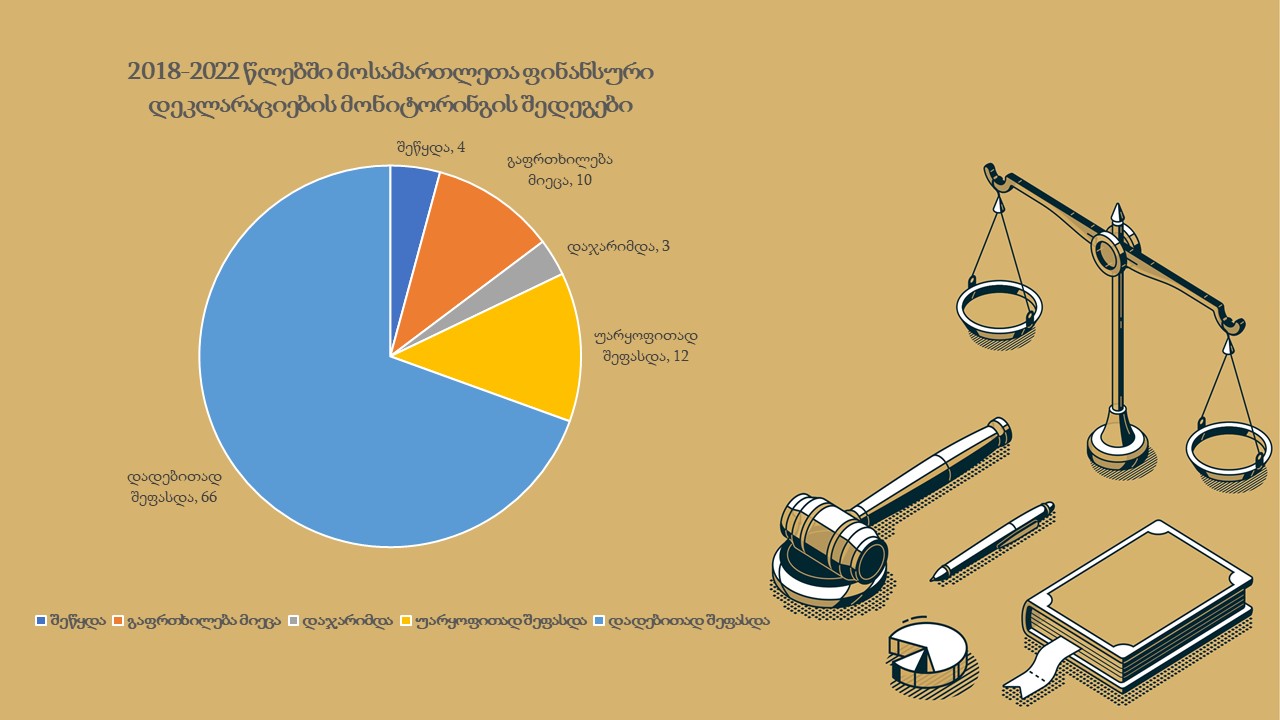An unprecedented number of judge's asset declarations are expected to be audited this year
Table of contents

As there are 60 judges on the list of individuals whose declarations will be audited, an unprecedentedly large number of judges' declarations will be examined in 2023. The Civil Service Bureau, meanwhile, looked over 95 judges' financial declarations from Georgia's Common Courts between 2018 and 2022.
An official is required to disclose their property and family members' financial resources once a year under Georgian law's "On Combating Corruption" article 14, which is intended to prevent corruption and ensure transparency. In Georgia, the stated obligation dates back to 1998, but since 2010, asset declarations may be submitted online at www.declaration.gov.ge.
In 2017, in Georgia was launched a system of monitoring asset declarations submitted by officials within the framework of the action plan "Open Governance in Georgia." Its purpose is to confirm the completeness and accuracy of the data contained in the declaration.
The system of monitoring the declaration of assets of officials is part of the government's anti-corruption and integrity policy. It encourages effective public administration, responsible use of public funds, and decision-making grounded in the best interests of the general public. The system should detect cases of corruption, including conflicts of interest.
Given that corruption is one of Georgia's primary concerns, asset declaration monitoring is crucial. Transparency International found that Georgia's corruption perception index has remained stable since 2012 and has not considerably improved. Georgia's scored 56 points in 2022, which is 10 points less than the 66 average score for Europe.
When international partners and local civil society talk about the issue of corruption related to influential judges in the justice system, naturally, the examination of judges' financial disclosures demands special consideration.
Every year, the Civil Service Bureau examines a specific number of declarations, and at the end of each year, it posts the findings of its analysis on the Public Services Bureau's official website. We made the decision to investigate how responsible and diligent judges are when completing the asset declarations by looking at these reporting materials.
Official data of the results of financial declarations monitoring.
- The Civil Service Bureau looked into the financial reports of 21 judges in 2022; 17 cases had a favorable evaluation, 1 judge only received a warning, and the examination of declarations of 3 judges was terminated.
- In 2021, the Bureau examined the declarations of 21 judges. Only 12 judges, however, received favorable evaluations, four judges were fined, and in the cases of 5 judges, the Burau was limited to a warning.
- In 2020, comparatively fewer judges were subject to scrutiny: 11 out of 14 judges were favorably evaluated, two were fined, and one was given a warning.
- The Bureau examined the declarations of 25 judges in 2019; three people received fines, and two cases resulted in warnings. Only 7 of the 14 people that were checked in 2018 earned a favorable evaluation.
The Civil Service Bureau analyzed 95 declarations of judges (including 4 former judges) for the period of 2018 to 2022, and the findings are as follows:

What are the key errors in the declarations of judges?
The majority of judges' declarations were evaluated favorably, although it should be noted that the current monitoring system primarily serves to verify the completeness and accuracy of the declared data, rather than to detect and prevent potential cases of corruption offenses. Accordingly, the monitoring of declarations by the Civil Service Bureau cannot function as a powerful tool to fight corruption and misalignment of interests, although it creates an objective image of a particular official - at the very least, the fact that a declaration was incorrectly completed and negatively assessed casts doubt on the person's high level of integrity.
Submission of the asset declaration status follows from the obligations assumed by the official to the state and society. By filling the asset declaration, an official assumes responsibility for the legality and integrity of the assets they have acquired and the income they have received, which, in turn, is a prerequisite for the honest use of the official powers granted to them.
When completing the asset declaration, the judge has a particularly high level of responsibility, but as the monitoring findings demonstrate, more than one fact of breach of this responsibility has been proved.
Negative evaluation
Judge Levan Murusidze, a judge who is subject to American sanctions and was inspected by the Civil Service Bureau in 2018, is one of the judges who received negative monitoring results. Judge Sergo Metophishvili received negative evaluation results in the same year. The cause of the negative assessment is not explicitly stated in the 2018 monitoring report. Generally, a declaration receives a negative review results when one of the following conditions holds:
- Failure to deliver data and documents the Bureau requested during the monitoring process;
- Submitting a declaration using inaccurate or missing information.
Disclosure of information in the declaration that does not comply with the Law of Georgia "On Conflict of Interest and Corruption in Public Institution" and the Law of Georgia "On Public Service." Contrary to the 2018 monitoring report, the report for 2019–2022 also lists the following reasons for the negative monitoring results of judges' declarations:
• The declaration does not contain information on the movable property of the official;
• Inaccuracy in the balance of the official's bank accounts;
• Inaccuracy in the material result of the official's contract;
• Inaccuracy in the balance of the declarant's salary account;
• The declaration by the declarant omitted details regarding a family member's bank accounts;
• The declarant did not disclose the family member's entrepreneurial endeavors ;
• The declarant incorrectly reported the amount of substantial result (expense) specified in the loan agreement;
• Inaccuracy in the balance of the bank account of the official and family member;
• Inaccuracyin in the income of the official's family member;
• The declaration makes no mention of a family member's remuneration.
A Warning
A warning is given to the official if there is a minor violation in their asset declarations. The Civil Service Bureau issued a warning to judges in the following cases:
- The bank account of the official's family member did not reflect in the declaration;
- The declaration contained incorrect information about the official's expenses;
- The bank account of a member of the official's family was not shown in the declaration;
- An error in the income received by a family member;
- An error in the material result received under the loan agreement;
- The amount of personal property listed in the declarant's name was inaccurate in the declaration.
A Fine
In case of a significant error in an official's asset declaration, the official is fined 20% of the amount of the official fine, but not less than GEL 500. There were only three instances of judges being fined between 2018 and 2022. Among the fined judges in 2019 were: the Chairperson of the Supreme Court of Georgia, Nino Kadagidze, and Supreme Court Judge Merab Gabinashvili (at the time, both judges worked at the Tbilisi Court of Appeal). Regarding the fine's justifications, they are as follows:
- Incorrect information regarding one's own real estate and bank account balances;
- Unspecified bank accounts of a family member. Material result of a contract under their name has a substantial error;
- A family member's bank account is not stated.
In 2023, whose asset declarations will the bureau review?
In January 2023, the Civil Service Bureau made public a list of people subjected to asset declaration monitoring. It should be emphasized that this year, an unprecedentedly high number of asset declarations will be checked. The names of the following judges are included in the 46 judges chosen by a commission from the list of 60 to be monitored: Levan Murusidze, Irakli Bondarenko, Merab Gabinashvili, Dimitri Gvritishvili, Shalva Tadumadze, Levan Tevzadze, and Giorgi Mikautadze. The rest 14 judges were chosen through an electronic system using the principle of random selection.
Here is the complete list of judges who will be monitored in 2023.
How does the Civil Service Bureau compile the list of persons to be monitored?
According to the following legal criteria, declarations are chosen for monitoring purposes:
- By using a single electronic system to randomly choose officials;
- A specially formed impartial commission involving representatives of non-governmental organizations and academia.
Besides, the asset declaration monitoring system allows for a high level of public participation: based on a well-reasoned written application, anybody may request the Civil Service Bureau to verify the facts that an official has disclosed.
Based on a number of criteria, such as a particular risk of corruption, a high level of public interest, and errors discovered through monitoring, an independent commission chooses declarations for review.
Despite being noted in the reports for 2019–2022, the 2018 Bureau report omits to clarify the criteria used to choose judges. Based on this information, the automated system chose 67 judges at random from a pool of 82, and the commission chose 15 judges. In 2019, the commission created a list of judges who would need to be monitored. The list of those picked by the commission is as follows: Levan Murusidze, Dimitri Gvritishvili, Revaz Nadaraya, Tamar Oniani, Vasil Roinishvili, Nino Sandodze, Paata Silagadze, Merab Gabinashvili, Mzia Todua, Nino Kadagidze, Grigol Giorgadze, Mikhail Chinchaladze, Irakli Shengelia, and Mariam Tsiskadze.
For an audited unified list of judges' asset declarations for 2018-2022, see here.
---
The materials distributed by courtwatch.ge and published on the website are the property of "Georgian Court Watch", when using them, "Georgian Court Watch" should be indicated as the source.






























